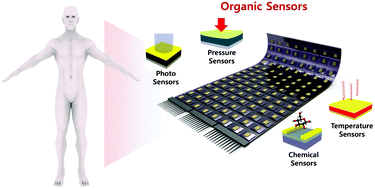Recent advances in organic sensors for health self-monitoring systems
Abstract
Health self-monitoring systems that can automatically recognize health information and respond in real-time through wearable sensors and artificial intelligence are one of the major development issues of the fourth industrial revolution. To realize such health self-monitoring systems, it is essential to develop wearable sensors that can detect biophysical signals from the human body. Organic sensors based on organic semiconductors or conductive materials are receiving a lot of attention as wearable sensors for health self-monitoring systems due to the advantages of their flexibility, stretchability, low cost, and light weight. Here, we review recent developments in organic sensors for health monitoring and methods for improving their performance.

- This article is part of the themed collection: Recent Review Articles


 Please wait while we load your content...
Please wait while we load your content...